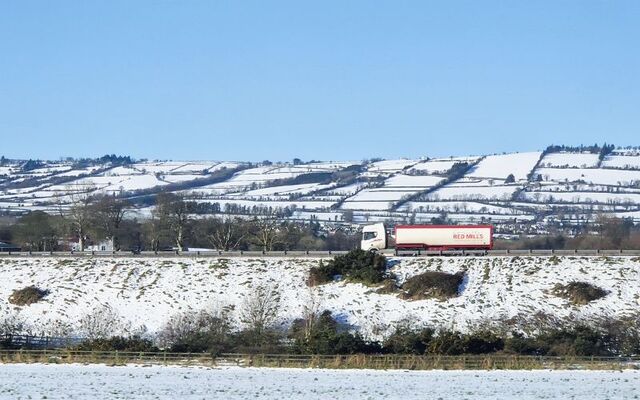A nationwide Orange weather warning has been put in place across all counties of Ireland except Donegal, which is under a Yellow alert until Thursday morning.
Met Éireann predicts that temperatures could fall to lows of at least -8C (17.6F), and even to -10C (14F) in some parts, which would be the coldest weather the country has experienced since 2018 when mercury levels dropped to -9.7C (14.5F) at Durrow, Co. Laois on March 1.
The Defence Forces have been drafted to some of the worst hit areas, such as Kerry, Cork, Limerick and Tipperary, to offer assistance to communities and vulnerable people, and those bearing the brunt of water shortages, power outages, school closures and blocked roads.
The Irish Red Cross has also deployed some 140 volunteers, ambulances and four-wheel drives this week to assist in 84 medical transports amidst challenging road conditions.
"Conditions in north Cork, Tipperary, east Limerick and up into the midlands remain extremely challenging,’ said Deirdre Garvey, secretary general of the charity.
Read more
Arctic blast
"Travel time for tasks has easily doubled, if not tripled, on some routes. Our crews are prioritizing support for the HSE with time-sensitive patient requests such as dialysis."
Properties without water on Tuesday evening dropped to approximately 8,000, which is about 32,000 less than Monday morning. However, this figure is expected to rise again during the Orange weather warning. Uisce Éireann’s [Irish Water] head of water operations Margaret Attridge is asking the public to conserve water and to report any leaks to them.
"Letting us know of breaks on the public network allows us to dispatch our expert crews as early as possible, therefore protecting the levels of water in our reservoirs for the whole country," she said.
"Conserving water at home and at work can help safeguard water supplies for as many people as possible, especially for our vulnerable customers and essential services such as hospitals and nursing homes."
Ms Attridge stressed that leaving taps running will not necessarily prevent pipes from freezing and could impact the local water supply.
Taoiseach Simon Harris has urged people to "keep their guard up" as the "treacherous" conditions take hold, saying: "We will experience cold weather, the likes of which we’re not very used to in this country… In many ways, it could potentially be a more dangerous period of time because while snow may not be visible everywhere, footpaths and roads can be extremely dangerous."

The Curragh Plains, County Kildare.
Mr Harris said that gritting and salting times will be increased to three times a day, and that additional supports will be provided to the worst-hit counties. He acknowledged the safety concerns many parents have about their children returning to school. The decision to close is a matter for individual school management authorities.
"I do appreciate that that’s a significant burden on principals, on teachers and boards of management, and it’s also a significant concern for parents, of course, who are trying to plan their own lives and having their children cared for and indeed going to work themselves," Mr Harris said.
"I do believe everything that can be done is being done."
8,000 properties remain without water
The first Status Orange warning came into effect for 22 counties on Tuesday night at 8pm, while a second Orange alert for all counties except Donegal will start this evening at 6pm until 11am on Thursday. A nationwide Status Yellow low temperature and ice warning is also in place and will be in effect until 6am on Friday morning.
Forecaster with Met Éireann Rebecca Cantwell told the Irish Daily Mail: For the next few days we’ll experience very cold daytime temperatures and extremely cold night time temperatures.
Read more
It will get down to about -8C in many places across the country, but in very localised parts it could drop to -10C. This will lead to many complications as any thaw which occurs during the day is going to refreeze again so we’re expecting widespread and severe frost and icy stretches across the country. It will make for extremely hazardous traveling conditions, particularly in morning times.
Ms Cantwell said a low-pressure system is set to move over the country from the south on Friday, which will bring warmer temperatures, adding: "Friday and Saturday will be less cold and then on Sunday daytime temperatures look like they’ll return back to the higher single figures, possibly reaching 10C or 11C," she said.
Meanwhile, a delivery driver for a major supermarket chain told the Mail that some of his colleagues are refusing to work in the adverse conditions.
He said: "Our trucks don’t have the proper tires to travel uphill on icy roads; it’s very dangerous especially in more rural areas of Dublin. There’s now a big delay in people getting their groceries because of the snow."
Local authorities have confirmed that beds will be made available for any rough sleeper who requires one, while Keith Leonard, national director of the National Directorate for Fire and Emergency Management, has asked the public to keep an eye out for vulnerable neighbours.
"You may know someone who is elderly or who has mobility issues and lives nearby – this would be a good time to check in on them and make sure they are okay," he said.
* This article was originally published on Extra.ie.




Comments